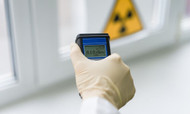Radiation Testing: 3 Tips for Choosing the Right Detector
Posted by William Kimmell on 28th Dec 2022
Substantial amounts of radiation can have serious health consequences. As a result, you must have the proper radiation detecting equipment to limit the danger of getting exposed. Discover three tips for choosing the right radiation detector to help protect yourself.
Know Your Options
When it comes to radiation detection, you'll have a couple of distinct options in terms of market standards. There are dosimeters and personal radiation detectors, both effective at what they do. You can use them in many situations.
- Personal radiation detectors (PRDs) are small devices that efficiently detect gamma, beta, and neutron rays. You can use them in various tricky situations, including underwater, in darkness, and in exceedingly dusty locations.
- Dosimeters exist in a variety of forms, including disposable film badges and pagers. Dosimeters measure the amount of radiation a person has been exposed to while wearing the instrument, and not necessarily the radiation in the surrounding environment.
Understand the Environment You're Working In
Even though most radiation detection devices share characteristics, they can differ concerning sensitivity, core detection, and measuring technology. You’ll need to pick the best possible detector that fits the requirements and expectations of your profession.
For example, let's say you’re a medical technician in a radiology department. Your principal goal for radiation detection is to support radioactive lab equipment like X-rays and check for leaks. Your detection requirements will be quite different from that of a military person who works at nuclear weapons installations, long-range navigation stations, or atomic power plants managed by the military.
Consider Whether You Need a Fixed or Portable Option
There are distinct types of monitors for both personal and area-wide detection. Area-wide detectors will indicate low and high radiation alert levels and detector failures in one environment. In contrast, people carry individual detectors or fasten them on their person.
These three tips for choosing the right radiation detector can help guide you in the right direction for your workplace. TG Technical Services offers an extensive range of radiation monitors that can match your workplace requirements. Feel free to contact us with any questions you may have about our products.

